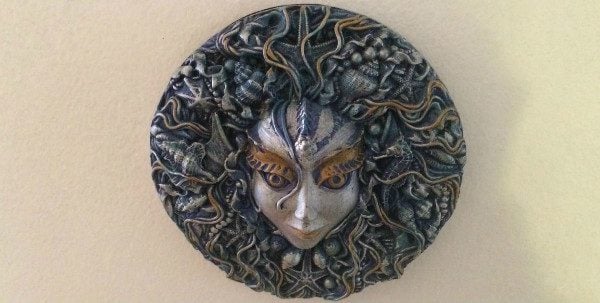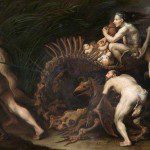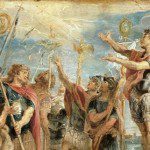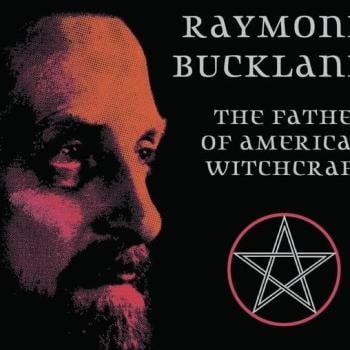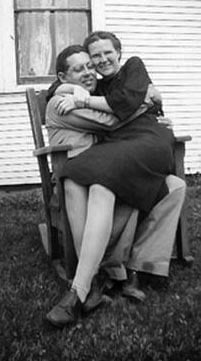
While Feri doesn’t have the numbers of something like Gardnerian Witchcraft, it has still been hugely influential. Starhawk was a student of Victor and Cora, as was T. Thorn Coyle. Paganism’s first true bard, Gwydion Pendderwen was also a student and friend of the family. I don’t think anything I can write is capable of truly capturing the impact Cora and Victor Anderson have had on American Paganism. These words by Penny Novack taken from a memorial page to Victor on the Witch’s Voice give voice to his (and Cora’s) huge influence:
I can’t adequately explain the intricacy of the connections in our lives created by the influence of Victor and Cora Anderson. To us, our beloved copy of his book of poetry and the songs which were his from Gwydion’s first album tied together a sense that our commitment to a future, national Pagan community could happen. If there is poetry and art then there is culture. And where there is culture, community has an anchor in the future. For years, the little I knew of these two was enough to be one of my hopes and mainstays, along with Gwydion’s album.
. . . Our grandchildren sing Gwydion’s songs. These are our history, but what we did not know was that much else which is our history and our culture flowed out from the work of Victor and Cora Anderson. In teaching, they created a huge pool of talented, intelligent Witches and Pagans whose huge body of work has deeply influenced the entire nation. Within this dynamic fountain of creative force which has fed and lifted the psyche of the those whose lives paths followed the Old Religion, were all the arts plus philosophy and healing.
No other single source in this country has had the tremendous impact of Victor and Cora Anderson if only by the teaching and vision they must have given their students. And while we, who were a continent away, have been sustained and validated by this living treasure, I don’t believe many are aware of the connections or how much gratitude we all owe.
For all of Feri’s influence in greater Pagandom, it often feels like a history on the margins. Margot Adler’s Drawing Down the Moon contains just a few pages about Victor and Cora, as do similar volumes by Aidan Kelly and Chas Clifton. One of the more amazing things about the Anderson Feri tradition is just how old it is. Aidan Kelly offers a brief sketch:
Victor was born May 15, 1917, in New Mexico; his family moved to Bend, Oregon, when he was quite young. He claimed that he underwent a sexual initiation by an old woman at age nine. According to the research of Valerie Voigt . . . one story that Victor repeated fairly consistently was that he was initiated into the Harpy Coven in Ashland, Oregon, in 1932 . . . The coven was quite eclectic, mixing Huna with varieties of folk magic more common in the continental United States. He said that the coven’s emphasis was on practical magic; there was little concern with worship, theology, ethics, or ritual. They did celebrate the Sabbats by getting together to work magic on them, but the only time they met in a circle, Victor said, was when they were eating—and yet this ordinary-looking meal was for them, he says, part of the celebration of the Sabbat.
Any exploration of Feri in absence of a teacher in the tradition is best done through the works of Victor and Cora Anderson. I suggest starting with Victor’s poetry which can be found in Thorns of the Blood Rose and Lilith’s Garden. Cora’s Fifty Years in the Feri Tradition should be required reading for all American-Witches. I found The Heart of the Initiate featuring letters and commentaries from both Victor and Cora, especially illuminating.
In order to learn a bit more about the tradition I was recently able to talk with Anaar Niino a current Grandmaster in the tradition. Before talking to Anaar I’d never had much desire to study Feri, and now I find myself completely intrigued. Our conversation really helped me to gain a greater understanding and appreciation of the tradition. I don’t practice the Feri Tradition, but Victor and Cora both have a place with the other Mighty Dead on my altar. Thanks to Anaar and thanks to you for reading!
Jason: In California’s Bay Area we are all at least a little bit familiar with the Feri Tradition, but in many other places in the United States (and the world) that’s not the case. Can you briefly sum up the Feri Tradition for those who aren’t familiar with it?
Anaar: It’s a sexual tradition. Which doesn’t really employ a lot of physical sexual practices. It’s an ecstatic tradition; we are sensual people. Our rites and practices aren’t all about the sexual act its self, it’s the energy of the tradition.
In my practice with the Andersons we never followed the basic Wiccan script. Ritual as practiced in the Anderson home was very different, very homespun. No calling of the guardians. Sometimes we circled, Victor described the reason for casting a circle is to create a lens. The gods are looking through a microscope and we are looking through a telescope and we could tune the lens, and make it easier to reach the gods.
I’ve come across several different spellings related to Anderson Feri over the years. Is it Feri? Faery? Or Faerie? Do the various spellings reflect different ideas within the tradition?
When I came in it was spelled the Old English way (Faery), but at some point the confusion between the Anderson tradition and others that called themselves Fearey became so profound that Victor said that we should change it to Feri. The “eri” means what we do, our work. We do wild magical works. That came after I started studying, the impetuous for the change was to try and avoid confusion, little did he know it would cause more confusion later on.
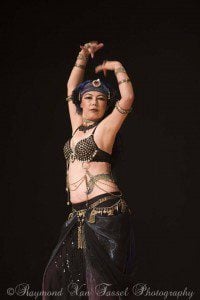
There are a lot of memories. Victor was the front man, he would do all the teaching and the talking, when he was alive people came to see Victor, he was the charismatic guy. Cora was old school Kitchen Witch, she’d be in the kitchen doing her own magic, feeding us, she was a very gracious southern lady. I think a lot of people underestimated Cora Anderson, the longer I spent with them I realized you would not get very far with Victor without Cora’s consent. She had an eye, and you could see people shrinking at you under her gaze. She was looking straight down into the bottom of your essence. If Cora didn’t want you around you wouldn’t be invited back.
They would never turn anybody away, ever. A lot of people are surprised by that, because a lot of people have come into their vetting process and then move on. Cora said this herself: “you’d stop telling people important things and people would go on their way.”
They were real people, regular guys. They had their foibles, and strengths, but they weren’t god-like entities that had descended upon the Earth. They were common folk, no airs, no robes, no massive altars.
Do you see any of their stamp on things in the broader Pagan world? Are the “Feri rituals” at a place like PantheaCon representative of what Victor and Cora did?
They were regular people, the rituals were simple. Even if I did a ritual at Pcon it would not resemble ritual done at the Anderson home. What we did at their house is not reflected very much at the bigger festivals. There were very few ritual rules. Our workings were more authentic, and to the need of the moment. Occasionally celebratory, but I don’t see the Andersons very much at big festivals.
The big rituals are not how I practice at home. But the energy is there. You’ll know it’s Feri if your spine tingles, your head starts buzzing or you get a great surge of sexual energy. If you get turned on it’s Feri no matter the structure of the ritual. It’s Feri if you find intense sexual energy running through your body.
Feri has taken on a life beyond the home of the Andersons. It’s taken on a lot from very powerful witches who built a version of Feri that looks more like Modern Paganism. Feri in the Anderson home looked more like folk magic with an emphasis on personal Luciferian power and ecstasy.
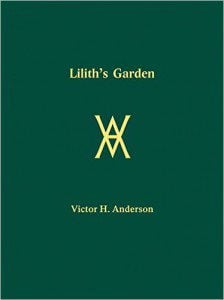 So in that sense, Feri is more about a feeling than a specific way of practicing?
So in that sense, Feri is more about a feeling than a specific way of practicing?
Cora would say “to be Feri is to be a good person.” It’s a very paradoxical tradition. There are not a whole lot of rules about rituals and practices. There’s almost not even a real solid intellectualized set of ethical rules. Feri is a practice for rebellious people, you can’t make rules for rebellious. I don’t want it to seem like we aren’t a bunch of people who just go off and do what we want. We aren’t the spiritual equivalents of junkies going from one sensation to another. The process of getting in touch with the gods is to get in touch with the gods, and sometimes structure inhibits the process.
When you go these conferences you meet a lot of intellectuals, Feri wants to balance that with getting in your body. I don’t consider myself an intellectual, I consider myself a sensualist. Thorn is very intellectual, Feri isn’t a tradition that works more out of feeling that intellect, our work is to join the two not balance the two divine twins so that there no is conflict. No conflict no complexes.
I have a passion for it, I’m obsessed by it. I can’t go very far without thinking about it. We are all so passionate about it. I can pick up the phone and think this is very Feri.
You mentioned Lucifer, that’s sort of taboo, was that a deity you worked with?
For me personally it’s a way to describe energy. Victor was very Luciferian, he was very strong about your personal power, you are a god. I’m hearing a lot of stuff about the power of the gods and how great they are but Victor would say “so are you, you are a part of the Pantheon.” Victor said “God is self, self is god, and god is a person like myself.” In Victor’s view we were equal to the gods, our bodies were not able to hold as much power and we haven’t been around as long, but we are as strong as they are. Victor spoke about marriage to the gods when we worked with them, an equal partnership.
Victor would say you are a god NOW. Own it.
Is it safe to say that the Reclaiming Tradition is a version of Feri for the masses?
Most Feri practitioners would not consider Reclaiming a line, they would use the term offshoot. It’s an offshoot of Feri. Mainly because it doesn’t have that same energy signature. If you get in a room and put Reclaiming in one area and Feri in another you would see two groups. You wouldn’t see one group with two crowds.. You’d see two different groups.
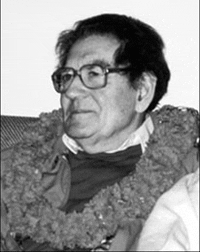
It’s debatable. Victor said all the gods are Feri gods. The notion is that the Star Goddess gave birth to everything, since she gave birth to the gods they are a part of her. The gods are also She. All the gods are Feri gods.
There’s this idea in Feri called the lemniscate, this is a commonly held Feri description of the gods that was never part of Anderson teaching. So you’ve got a debate whether or not the lemniscate is Feri or not. It’s the Triple Goddess mirrored by a Triple God-youth god male, an adult warrior type, and an elder-mystery man. The trouble with that is that in Anderson thinking the gods are both male and female in one, all the gods have hermaphroditic principles depending on how you choose to work with them.
When working with male energy Victor stressed the Divine Twins. The twins are dual consorts of the Goddess. They are her lover, her son, sibling, not necessarily male/male paired. The Divine Twins could be male/female or female/female.. There’s a particular deity worshipped in Feri called the Peacock Lord, he’s the union of opposite. Victor explained that when working with the twins you could work with one, or the other, or both at the same time. When those unions of opposites are paired, their power is increased many fold. And imagine trying to hold two opposites instantaneously. You can’t hold it for very long. But if you could there’d be nothing you couldn’t accomplish.
So you talk about holding that power, is it like Drawing Down the Moon?
You want to get to the point where you know body mind and soul that it’s never either or it’s either and. To carry that with you in every situation wherever you go is the end goal. It’s neither right or wrong, it’s right and wrong. It’s not black or white, it’s black or white. You aren’t male or female you are male and female, always.
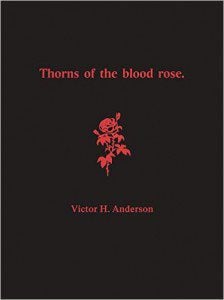 Feri is an initiatory tradition which can make entry difficult, so how does one get involved in Feri? In the Gardnerian tradition there are “Outer Court” rituals for the non-initiate, is there anything similar in Feri?
Feri is an initiatory tradition which can make entry difficult, so how does one get involved in Feri? In the Gardnerian tradition there are “Outer Court” rituals for the non-initiate, is there anything similar in Feri?
To get involved you have to find a teacher. A lot of people are fey, but if you want to become a part of the initiatory Anderson Feri line you must find a teacher. There is a great book of Feri, you can find it in Victor’s poetry. Feri is a tradition of poetry, art, and ecstasy. If you really want to learn about Feri come watch me dance, read Victor’s poems. There are many artists who are able to convey being fey but if you want to become a part of the line you must find a teacher.
I’ve read a lot about schisms in the Feri tradition over the last few years. Is the Feri tradition one tradition or several? What makes someone a Feri initiate?
We don’t have puppy papers, but we do inquire. If someone comes forward and says I’m initiate, was ask “who brought you in?” We will talk to them.. There are secrets that need to be guarded. You can psychically tell, they walk differently.
There was a young woman who I had met and I swear I thought she was the mousiest woman I had ever met. After one year of study I thought she had grown a foot taller. There’s an energy signature-a great deal of increased confidence-being more relaxed in the world. You can feel it, you can see it in people. It becomes a physical transformation. I had to ask who this woman if she had grown a foot taller after one year of study.
There are somethings that are not Feri, clearly. It’s rarely about how you do something it’s about how you treat people. If you are a god Jason I certainly can’t start giving you orders. I can’t tell you what to eat, I can only tell you if you are hurting yourself. I can only tell you if I will continue to engage with you. I can’t tell you how to do stuff, or what to do. That’s contrary to Feri. It rarely has to with how you do this or that, but whether or not you empower your sovereignty while respecting mine.
The biggest schism is about practice, it’s about charging for classes. That precipitated the big huge break, the very loud public break. Whether or not one should charge for teaching the Craft. That’s a political issue. It’s political, not spiritual.
Where do you come down on that?
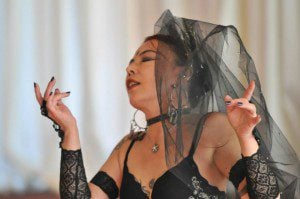 I’m completely in line with the Andersons’ view point: “charging for classes is fine.” If you want to run a six week or eight week course with a set fee, why not? You pay for colleges. He thought that something like this could be taught in universities. What you can not charge for is an initiatory tract. If you just want to learn this stuff you can charge, but if you came to me and said “I’m really devoting myself to Feri and I want an initiation and be trained,” you can’t do that. This is a potential family member. Feri is a family, and you don’t charge a family for succor, nurture. For professional settings, no problem. It’s a service, like charging for a reading. You’re paying for information and it’s perfectly acceptable, however some people feel differently.
I’m completely in line with the Andersons’ view point: “charging for classes is fine.” If you want to run a six week or eight week course with a set fee, why not? You pay for colleges. He thought that something like this could be taught in universities. What you can not charge for is an initiatory tract. If you just want to learn this stuff you can charge, but if you came to me and said “I’m really devoting myself to Feri and I want an initiation and be trained,” you can’t do that. This is a potential family member. Feri is a family, and you don’t charge a family for succor, nurture. For professional settings, no problem. It’s a service, like charging for a reading. You’re paying for information and it’s perfectly acceptable, however some people feel differently.
The most vocal people from the schism feel as if the Craft is not something to be sold. There has been brought up the idea of equal exchange for services, but if you are coming to me as the expert and you are a chef that makes sense. The notion of equal exchange needs to be a little more thought out. It’s not an equal exchange if you go to a well known priest for training and you are offering her some sandwiches. What constitutes an equal exchange?
Nobody ever asks how much we spend to support the Craft. The argument is one sided. Why is it ignoble to charge for the service of teaching? We charge for art. Teaching is a service, that’s well provided by very few teachers. There’s a backdrop of several Pagans who have been to some workshops and are suddenly a teacher.
Can you talk a little bit about some of the different “lines” in Feri?
I really can’t talk about the lines that much. I don’t feel qualified to because I’m not involved in all the different lines. A lot of that stuff looks very unfamiliar to me. Very unfamiliar. The break happened a long time ago, it’s just that the political aspect brought it to the forefront, and made me realize that there are many different lines of Feri and they don’t all mesh together. I’d talk to people from the same line and what they did would be completely unfamiliar.
It’s a natural happening because people are creative. We have this notion of tradition as a solid thing that’s never changing, but the culture is changing so fast now. I don’t know if we could have that notion of a solid tradition right now. It’s all shifting and changing I’m having trouble keeping up with cultural traditions. How do you have a solid tradition in a sea of social change? How do you have a tradition be unchanging during a paradigm shift? I think it would take serious effort.
I don’t want to put you on the spot, but I’ve heard you possess the title of Grandmaster in Feri?
When Victor died people started swooping in on Cora, this was after her stroke. We all know that the Craft is filled with well meaning giving people but it’s also filled with predators. But it became very clear very early on when you saw things missing from her house that things were not right. Cora asked me to become the Grandmaster and I refused out right but she continued to ask. She wanted to see the tradition continue, to see it passed on.
When she brought my name up I actually cried, I’m still feeling very weird about it. To me Victor is the Grandmaster. It became clear to me that people are taking advantage of her. To have a Grandmaster in a weak body was probably not very good. I don’t feel like I’m old enough to be a Grandmaster or experienced enough. Somebody had to bear that banner so to speak.
After we went through a ritual to transfer the wand to me I did see a lessening of at least least thievery at the Anderson house. Books were missing, things were going away, it was disgusting. It terrified me to think that people in the Craft could do this each other. I took the title to protect her. I originally had every intention of letting it go after she passed away, but I didn’t. It’s a line, a connection to the Andersons I want to keep.
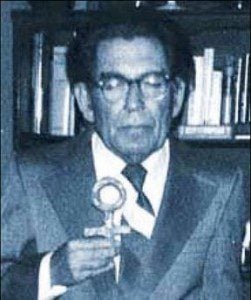
Victor Anderson was blind and this gave him a different perspective on life. He was a very talented astral traveller. He had many teachers, both in the physical and in the astral. He did pick up a lot of stuff from various cultures which informed Feri. His connection was very spiritual. He always said “that he never founded the Feri tradition.” When he heard of himself as the founder he got angry. He said this was a tradition out of Africa, just like we (all humans) came out of Africa.
I’ve read a lot of Victor’s published letters and the teachers he wrote about in them sometimes seemed to good to be true. Were many of those figured I’ve read about on the astral plane and not this one?
He talked about them as being actual, there was no difference between the worlds. He was an extremely talented psychic and it was all flesh and bone. He would describe sex on the astral realm, there no was no difference to him between and physical and astral being.
Where do you see the Feri Tradition in twenty years?
No idea. Sorry. I suppose if things were a little more settled down I’d have a better handle on it. If I were to guess I would see more more distinctions between the lines. That each line would increasingly become more distinct. That’s just a wild guess.
_____
You might also be interested in reading: American Paganisms: Feraferia.


